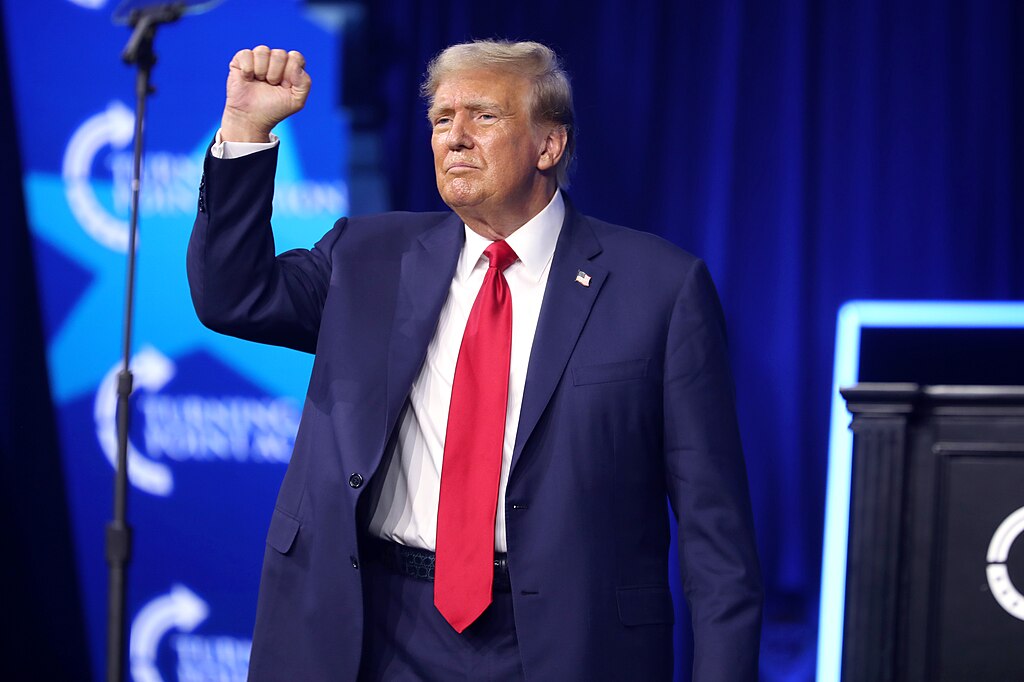Former President Donald Trump ignited controversy by questioning Vice President Kamala Harris's racial identity during a panel at the National Association of Black Journalists (NABJ) conference. The event, which took place on July 31 in Chicago, saw Trump address a group of Black female journalists, and his remarks about Harris quickly drew criticism.
During the panel, Trump expressed uncertainty about Harris' racial identity, suggesting that she had only recently embraced her Black heritage after a career focused on her Indian roots. He pointed out his confusion, claiming he didn't know Harris was Black until she "happened to turn Black" and now wants to be known as such.
This comment comes amid a backdrop of Harris' diverse background as the daughter of a Jamaican father and an Indian mother. Harris has been actively involved in Black communities, attending Howard University and being a longstanding member of the Congressional Black Caucus before becoming Vice President.
Scott Jennings, a former adviser to Republican President George W. Bush, weighed in on Trump's performance during an interview on CNN. He acknowledged Trump's effort to participate in the NABJ event but criticized his comments about Harris, suggesting they could have been better thought out.
The panel also included a heated exchange between Trump and Rachel Scott of ABC News. Trump accused Scott of giving him a rude introduction and deflected questions about his previous criticisms of Black individuals and journalists. His associations with individuals linked to white supremacist groups were also scrutinized, raising further concerns about his rhetoric and affiliations.
Throughout the discussion, Trump maintained that he had done significant work for the Black community, labeling himself the best president for Black Americans since Abraham Lincoln. However, when questioned about the contributions of President Lyndon B. Johnson, who signed the Voting Rights Act, Trump did not respond.
In response to the controversy, Vice President Harris took to social media, denouncing Trump's behavior and labeling his claims as part of a familiar pattern of divisiveness. She emphasized that the American people deserve better than what she described as Trump's disrespectful and divisive rhetoric.
The controversy surrounding Trump's remarks at the NABJ panel underscores the ongoing tension and debate over racial identity and representation in American politics. As Harris is expected to be the Democratic nominee for the 2024 presidential race, her background and identity will likely continue to be topics of discussion.
Pelosi's memoir, set to be published on August 6, promises to offer further insights into the former Speaker's perspective on Trump's presidency and the broader political landscape. As readers and political analysts await its release, the book is anticipated to spark further discussion about the dynamics and challenges of leadership in the current political climate.



 Trump Floats “Friendly Takeover” of Cuba as Rubio Reportedly Engages in Talks
Trump Floats “Friendly Takeover” of Cuba as Rubio Reportedly Engages in Talks  Israel Launches Fresh Strikes on Iran After Death of Supreme Leader Ayatollah Khamenei
Israel Launches Fresh Strikes on Iran After Death of Supreme Leader Ayatollah Khamenei  NYC Mayor Zohran Mamdani Meets President Trump to Tackle Housing Crisis and ICE Detentions
NYC Mayor Zohran Mamdani Meets President Trump to Tackle Housing Crisis and ICE Detentions  Philippines, U.S., and Japan Conduct Joint Naval Drills in South China Sea to Boost Maritime Security
Philippines, U.S., and Japan Conduct Joint Naval Drills in South China Sea to Boost Maritime Security  Israel Declares State of Emergency as Iran Launches Missile Attacks
Israel Declares State of Emergency as Iran Launches Missile Attacks  Pakistan-Afghanistan Tensions Escalate as Taliban Offer Talks After Airstrikes
Pakistan-Afghanistan Tensions Escalate as Taliban Offer Talks After Airstrikes  Australian PM Calls Alleged Western Australia Terror Plot “Deeply Shocking” After Arrest
Australian PM Calls Alleged Western Australia Terror Plot “Deeply Shocking” After Arrest  Netanyahu Suggests Iran’s Supreme Leader Khamenei May Have Been Killed in Israeli-U.S. Strikes
Netanyahu Suggests Iran’s Supreme Leader Khamenei May Have Been Killed in Israeli-U.S. Strikes  Denver Mayor Orders Police to Protect Protesters, Restricts ICE Access to City Property
Denver Mayor Orders Police to Protect Protesters, Restricts ICE Access to City Property  USITC to Review Impact of Revoking China’s PNTR Status, Potentially Raising Tariffs on Chinese Imports
USITC to Review Impact of Revoking China’s PNTR Status, Potentially Raising Tariffs on Chinese Imports  Germany and China Reaffirm Open Trade and Strategic Partnership in Landmark Beijing Visit
Germany and China Reaffirm Open Trade and Strategic Partnership in Landmark Beijing Visit  Pentagon Leaders Monitor U.S. Iran Operation from Mar-a-Lago
Pentagon Leaders Monitor U.S. Iran Operation from Mar-a-Lago  Pentagon to Halt Ivy League Programs for U.S. Military Officers Starting 2026
Pentagon to Halt Ivy League Programs for U.S. Military Officers Starting 2026  HHS Adds New Members to Vaccine Advisory Panel Amid Legal and Market Uncertainty
HHS Adds New Members to Vaccine Advisory Panel Amid Legal and Market Uncertainty  Trump Orders Federal Agencies to Halt Use of Anthropic AI Technology
Trump Orders Federal Agencies to Halt Use of Anthropic AI Technology  Macron Urges Emergency UN Security Council Meeting as US-Israel Strikes on Iran Escalate Middle East Tensions
Macron Urges Emergency UN Security Council Meeting as US-Israel Strikes on Iran Escalate Middle East Tensions  Iran Supreme Leader Ayatollah Ali Khamenei Killed in Israeli, U.S. Strikes: Reuters
Iran Supreme Leader Ayatollah Ali Khamenei Killed in Israeli, U.S. Strikes: Reuters 































